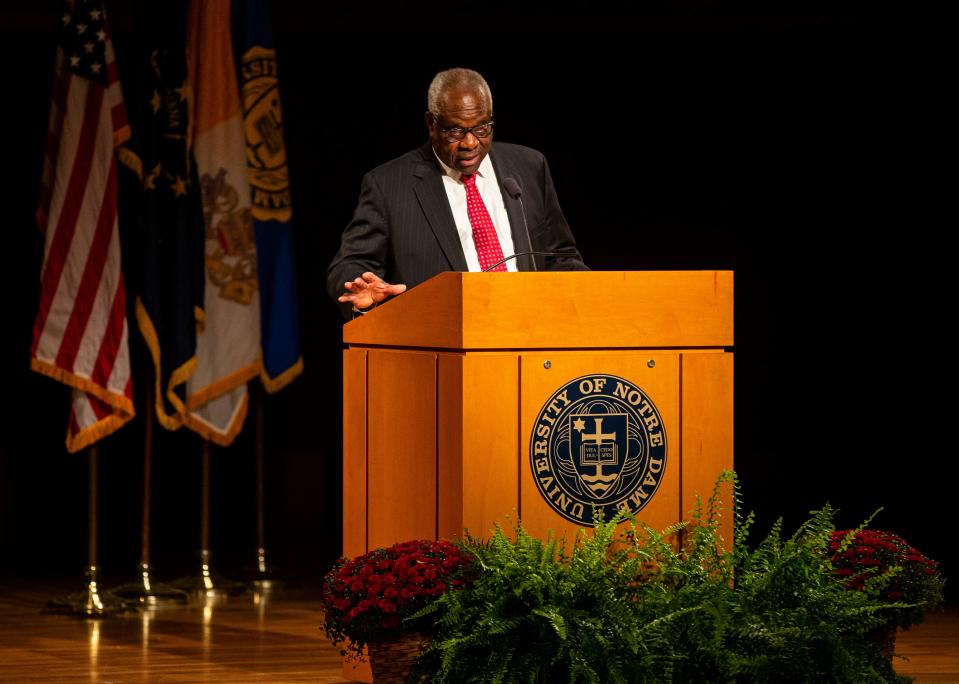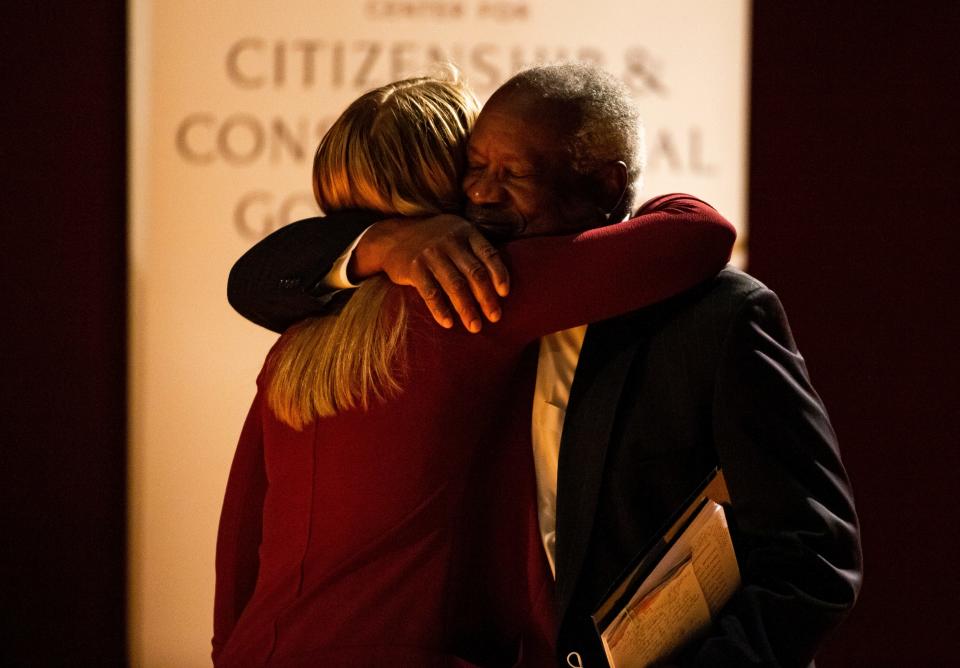Justice Clarence Thomas laments a 'race-obsessed world' in lecture at Notre Dame

SOUTH BEND — In a talk at the University of Notre Dame on Thursday, Supreme Court Justice Clarence Thomas showed his frustration with an increasingly divided America and lamented what he called a "race-obsessed world."
The second Black justice on the Supreme Court made a rare public appearance at the university, following a year of social unrest, racial tension and politicization of classroom teachings. During the talk, he compared experiences in his youth to current events.
"Every time I walked into a room, I had to look for something in common, and that's the way we grew up," Thomas said to a full auditorium at the DeBartolo Performing Arts Center. "Now look at us. We just seem like we keep dividing, subdividing into subcategories, sub-sub-categories of differences and emphasizing those differences."
Adding to the Supreme Court: Nomination puts Notre Dame Law School front and center
Thomas, the longest-sitting member of the Supreme Court, spoke at the invitation of Notre Dame's new Center for Citizenship & Constitutional Government.
Thomas spoke of his upbringing — raised by his grandparents in a Catholic home in the deep South, where "there was a deep and abiding love for our country".

He told the audience about being the only Black student in a Georgia seminary, becoming disillusioned with his country and faith following the 1968 assassination of Martin Luther King, Jr., and falling in quickly with "radical ideologies such as Black power" at 19. He would later return to a chapel at the College of the Holy Cross in Massachusetts, where he studied, and asked God "to take hate out of my heart."
Related video: Census says U.S. 'white only' race group is shrinking for first time
Thomas, who has consistently opposed affirmative action policies, called the segregation and race-based laws he was born into "repulsive" and "at odds with the principles of our country." But he also called the activism he experienced in the late 1960s "cynical" and "jaundiced."
Applications spike: Law school admissions are up at Notre Dame. Is is because of the pandemic?
He instead encouraged the audience to look to the ideals of equality outlined in the Declaration of Independence and the Constitution, which Thomas said hold a promise Americans have struggled, but not failed, to uphold.
"Today, there's a notable pessimism about the state of our country, and cynicism about our founding," Thomas said. "There are some that would even cancel our founders. We are all aware of those who assert … that American is a racist and irredeemable nation, but there are many more of us, I think, that feel that America is not so broken as it is adrift at sea."

Thomas during his talk did not mention the Supreme Court's recent 5-4 vote, in which he was in the majority, to deny an emergency appeal of a new Texas law banning most abortions.
As his lecture was wrapping up, some shouts emerged from the back of the audience.
"I still believe Anita Hill!" a few people with signs chanted before swiftly being led out of the auditorium. The audience cheered as the protestors were escorted away. Thomas appeared unbothered by the interruption, calling it later a "minor outburst."
Hill, a former employee of Thomas, accused him of sexual harassment during his 1991 confirmation hearing.
Hoosier react: Indiana leaders weigh in on Amy Coney Barrett's Supreme Court nomination
Reporters were not allowed to ask questions during the lecture and Thomas was not available for interviews after. Live-streaming and cell phone photos were prohibited.
In a moderated Q&A after the talk, Thomas took questions on the accessibility of Supreme Court opinions and whether justices should do more to connect with America's "flyover country."
While the court doesn't exist to serve constituents through public meetings like elected officials do, Thomas said, he pointed out that he encourages his clerks to write opinions for fellow citizens and not for law reviews.
He also described the joy he's found in "motor-homing" across America for the last 22 years, parking his RV at campsites, Pilot stations and Flying J's across the country.
"We sense amidst the noise telling us that truth does not exist, that there is something true, something transcendent, something solid, something that pulls us together rather than divides us," Thomas said. "My wife and I this summer were inspired when we saw in the RV parks the people who still hold these values."
Email South Bend Tribune education reporter Carley Lanich at clanich@gannett.com. Follow her on Twitter: @carleylanich.
This article originally appeared on South Bend Tribune: Supreme Court Justice Clarence Thomas delivers speech at Notre Dame

 Yahoo Movies
Yahoo Movies 